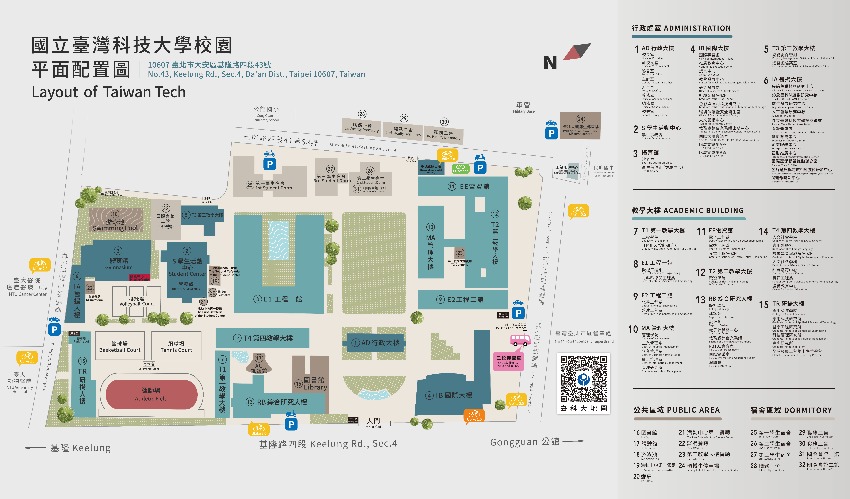General Education
Passed at the 175th Academic Affairs Meeting of the University on March 27, 2015.
Amended and passed at the 187th Academic Affairs Meeting of the University on March 27, 2017.
Amended and passed at the 192nd Academic Affairs Meeting of the University on June 26, 2018.
Amended and passed at the 206th Academic Affairs Meeting of the University on January 4, 2022.
-
National Taiwan University of Science and Technology (hereinafter referred to as "the University") regards general education as an essential part of its mission, as reflected in the motto of "Diligence in Action, Sincerity in Interactions." The goal is to cultivate modern technological talents who possess general knowledge, a healthy mind and body, and a foundation in international languages.
-
The core competencies of the University's general education include "citizenship responsibility," "global competitiveness," "communication and expression skills," "problem-solving skills," "lifelong learning skills," "diversity and caring abilities," and "artistic and creative abilities."
-
The University's general education, based on the principles of shared education, aims to guide students in understanding both academic principles and common sense, enabling them to succeed professionally and mature as individuals. It provides general literacy and worldly thinking for professional learning.
-
The University's general education is divided into five domains: "Social Practice," "Chinese," "English," "General Studies," and "Physical Education." The required credits for students in each program are detailed in the "List of Required General Courses" and the "Course Registration Guidelines for English Requirements for Four-Year Program Students."
-
The "General Studies" domain is divided into six dimensions: "Humanistic Literacy," "Contemporary Civilization," "Aesthetic and Life Exploration" based on interdisciplinary connections, "Society and Historical Culture," "Individual and Institutional Development," and "Natural and Life Sciences."
-
The following units offer courses for the University's general education: the General Education Center for the "Social Practice" domain, the Department of Humanities and Social Sciences for the "Chinese" domain, the Language Center and Department of Applied Foreign Languages for the "English" domain, the Department of Humanities and Social Sciences, various colleges, and the General Education Center for the "General Studies" domain, and the Physical Education Office for the "Physical Education" domain.
-
Courses considered for accreditation in the "General Studies" domain must be labeled with the corresponding dimensions according to the "Course Code Encoding Principles" of the University. Each course is categorized into one dimension based on its main nature.
-
Courses considered for accreditation in the "General Studies" domain should generally be offered as 2 or 1 credit courses. Courses with extensive content and approved by the Joint Education Committee may be offered as 3-credit courses. Courses in the form of weekly expert lectures are limited to 2 credits.
-
Proposed new courses for accreditation in the "General Studies" domain should be reviewed by the department (program) and college-level curriculum committees before being submitted to the Joint Education Committee for consideration of accreditation and dimension assignment. Each semester, the General Education Center compiles the list of general courses for confirmation by the Joint Education Committee.
-
In order to prevent students from concentrating on a specific area of study, courses in the "General Studies" domain with the same title should be limited to a maximum of two.
-
The series of lectures by distinguished speakers should be approved by the Joint Education Committee before being offered. Each college should offer no more than one such course per semester as a general guideline.
-
Courses considered for accreditation in the "General Studies" domain should not have prerequisites.
-
Courses considered for accreditation in the "General Studies" domain should have a minimum enrollment of 50 students, unless there are special reasons approved by the relevant authorities. The maximum number of students allowed for a course is limited by the capacity of the classroom.
-
During the initial course selection phase, courses in each domain may establish priority registration groups based on the nature of the course or reserve quotas for freshmen. After the computerized lottery for initial course selection, courses that have not reached the maximum enrollment limit should cancel the original settings and allow interested students to register online.
-
Graduate students who intend to take courses in the "General Studies" domain can add them during the add/drop period and follow the relevant regulations of the University regarding graduate students taking undergraduate courses.
-
For any matters not covered by this regulation, the relevant regulations of the University shall apply.
-
This regulation shall be implemented after approval by the University's Academic Affairs Council and any amendments shall also follow the same process.
Disclaimer: This document has been translated from its original Chinese version by a machine translation tool. The translation should be used for informational purposes only, and in case of any discrepancies or conflicts, the Chinese version shall prevail. The translator and the machine translation tool are not liable for any errors, omissions, or misunderstandings that may arise from the use of this translation.

